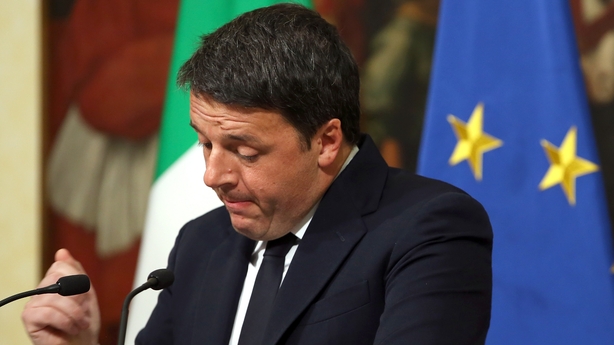Italian President Sergio Mattarella has told Prime Minister Matteo Renzi to put his planned resignation on hold until parliament had approved the 2017 budget, which could be done as early as Friday.
Mr Renzi announced he would resign following his defeat in yesterday’s referendum when Italians resoundingly rejected his proposed reforms to the constitution.
After a meeting with Mr Renzi, the president’s office said in a statement that the prime minister had said he could no longer remain in power.
The president told him he should stay in place until the budget is passed to prevent emergency funding rules from kicking in on 1 January.
Once the budget is passed, Mr Renzi could hand in his resignation, the statement added.
European Commissioner for Economic and Financial Affairs Pierre Moscovici earlier said Italy can handle the fallout from the resignation and the eurozone as a whole can manage all kinds of political shocks.
"I am confident Italy has the means to address the situation," Mr Moscovici told reporters on entering a meeting of eurozone finance ministers.
Asked if the Italian political crisis could trigger a wider eurozone crisis, Mr Moscovici said: "I am confident there will be no such crisis. We have the means to resist any kind of political shock in Europe."
Meanwhile, German Finance Minister Wolfgang Schaeuble said Italy should continue the economic reforms begun by Mr Renzi.
Mr Schaeuble said he had spoken to his Italian counterpart and believed that it was important for Italy now to have a functioning government.
Italian Finance Minister Pier Carlo Padoan was skipping the Brussels meeting and is among possible successors to Mr Renzi.
"Italy has to continue in a consistent manner on the path that Prime Minister Renzi has taken economically and politically over the past three years. Those responsible in Italy know that," Mr Schaeuble said.
He also said investors should be relaxed about the Italian referendum, which was a domestic issue, and said he saw no grounds for there to be a crisis for the euro currency.
The euro rebounded from 21-month lows earlier today, clawing back almost all the ground it had lost overnight after Mr Renzi conceded defeat in the referendum.
The opposition Five Star Movement hailed the No vote, at around 60%, as a rejection of the political establishment and has called for early elections.

Mr Renzi took power aged 39, presenting himself as the youthful, anti-establishment new force who would reform Italy's sclerotic economy and institutions.
Now, just two years later he has suffered a crushing referendum defeat, beaten by populist parties on the left and right who had painted him as the establishment.
But both the Five Star Movement on the left, and the anti-immigrant, anti-EU Northern League on the far right, are baying for early elections.
Following the Brexit Vote, and Donald Trump's victory in the US, Italy has been seen as the next domino in a wave of populist anger sweeping the west.
But with the country in the midst of a banking crisis, last night's result could pose a much more immediate threat to the single currency.
The euro tumbled as much as 1.4% in earlier Asian trade to hit its weakest since March 2015, as investors worried about increased political uncertainty in the euro zone.
But it recovered almost all of those losses in later morning trade, standing down 0.1% on the day at $1.0650.
We need your consent to load this rte-player contentWe use rte-player to manage extra content that can set cookies on your device and collect data about your activity. Please review their details and accept them to load the content.Manage Preferences

